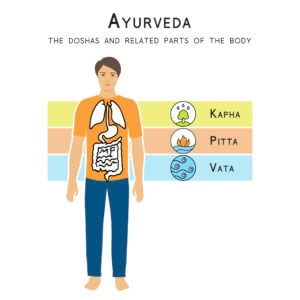The Science of Ayurveda and Its Impact on Personal Wellness
The Science of Ayurveda and Its Impact on Personal Wellness
Blog Article
Why You Need to Get It: The Transformative Power of Ayurveda Explained
Ayurveda, a time-honored system of medicine, uses a special point of view on wellness that transcends mere signs and symptom monitoring. As we explore the core principles and techniques of Ayurveda, it becomes obvious that its transformative potential prolongs far past traditional health standards-- raising the concern of how it might improve your understanding of wellness.
Comprehending Ayurveda's Core Principles
Ayurveda, commonly referred to as the "scientific research of life," is rooted in an all natural strategy to wellness that links the physical, psychological, and spiritual dimensions of well-being. Central to Ayurveda are the ideas of the five aspects, referred to as "Pancha Mahabhuta," which comprise earth, water, ether, air, and fire. These components integrate to create 3 primary energies, or "doshas": Vata, Pitta, and Kapha, each standing for different combinations of emotional and physical attributes.


Understanding these doshas is vital for determining a person's unique constitution, or "Prakriti," which guides individualized wellness methods. Ayurveda stresses equilibrium, supporting for a lifestyle that harmonizes these powers with diet, organic remedies, and day-to-day regimens. Moreover, Ayurvedic principles assert that wellness is not simply the absence of disease however a state of optimal vitality.
The practice of mindfulness and self-awareness is basic, encouraging individuals to establish a much deeper link with their bodies and the environment. By recognizing the interplay of physical and psychological variables, Ayurveda advertises a thorough understanding of health that equips people to organize their well-being, cultivating a course in the direction of holistic change.
Benefits of Ayurvedic Practices
On a regular basis integrating Ayurvedic techniques into day-to-day life can produce a plethora of benefits that improve total health. These time-honored traditions concentrate on attaining consistency within the body, mind, and spirit, resulting in boosted physical wellness, mental quality, and psychological equilibrium.
One considerable advantage of Ayurvedic practices is their capacity to promote digestion wellness. Customized nutritional recommendations, based upon an individual's dosha, can maximize vitamins and mineral absorption and lessen intestinal concerns. Additionally, Ayurvedic natural herbs and seasonings, such as turmeric and ginger, have anti-inflammatory properties that can assist in the prevention and management of chronic conditions.
In addition, Ayurvedic practices highlight the importance of everyday routines, understood as dinacharya, which promote stability and predictability in one's life. This uniformity can decrease stress and anxiety degrees and improve efficiency. Mindfulness methods, including meditation and yoga exercise, not only grow mental resilience however additionally improve psychological law.
Last but not least, by cultivating a link to nature and stressing holistic living, Ayurveda motivates individuals to involve in self-care and cultivate a feeling of community. Overall, the integration of Ayurvedic techniques can cause a much more balanced, vibrant, and meeting life.
Key Components of Ayurvedic Healing
What are the fundamental elements that contribute to the efficacy of Ayurvedic healing? At the core of Ayurveda exist 3 key elements: the concept of doshas, the focus on equilibrium, and the all natural strategy to health. The doshas-- Vata, Pitta, and Kapha-- represent the special combinations of the 5 elements that regulate specific constitutions. Recognizing one's dosha is essential for tailoring therapies that restore balance and promote wellness.
Equilibrium is a repeating style in Ayurvedic recovery, reflecting the idea that health arises from harmony within the body and in between the individual and their setting. Interruption of this equilibrium can bring about illness, demanding targeted interventions to bring back equilibrium.
In addition, Ayurveda welcomes a holistic technique, taking into consideration physical, psychological, and spiritual elements of health. This extensive perspective identifies that psychological well-being and lifestyle options significantly influence physical health.
Integrating Ayurveda Into Daily Life
Integrating the principles of Ayurveda into everyday life can substantially boost total wellness and advertise a deeper link to one's body and setting. By adopting Ayurvedic techniques, people can grow equilibrium and consistency within themselves, adjusting to their unique constitution or dosha.

Integrating herbal treatments and natural components right into personal care regimens can better strengthen Ayurvedic principles. Utilizing oils for self-massage, recognized as abhyanga, advertises circulation and relaxation. Additionally, integrating reflection or yoga exercise can boost mental clearness and psychological security, fostering an all natural approach to health.
Lastly, understanding ecological aspects, such as environment and seasonal modifications, allows people to change their way of lives accordingly, ensuring that their techniques continue to be helpful and reliable - Ayurveda. By weaving these concepts into everyday life, one can experience profound benefits, leading to a much more well balanced and satisfying presence
Personal Makeovers Via Ayurveda
The application of Ayurvedic concepts into everyday regimens commonly causes substantial individual makeovers, as individuals begin to experience extensive changes in both psychological and physical health and wellness. By accepting methods such as nutritional alterations, herbal supplements, and conscious reflection, numerous record raised energy levels, enhanced digestion, and enhanced emotional durability.
People usually discover that the holistic strategy of Ayurveda addresses not simply signs, however underlying inequalities within the body and mind. Taking on a customized dietary regimen based on one's dosha can lead to weight monitoring, reduced swelling, and better overall vitality. Furthermore, the consolidation of everyday self-care routines, such as oil pulling or Abhyanga (self-massage), promotes a much deeper connection to one's body, advertising self-awareness and nurturing psychological well-being.
As professionals delve deeper right into Ayurvedic ideology, they often discover a restored feeling of function and quality in their lives. This transformative journey urges individuals to grow mindfulness, leading to healthier partnerships and a higher recognition for the here and now moment. Eventually, Ayurveda encourages individuals to organize their wellness, promoting a purposeful and lasting improvement in their lives.
Conclusion
By implementing and recognizing individual doshas customized methods, Ayurveda promotes ideal health and psychological durability. The principles of Ayurveda offer valuable insights for growing site here a satisfying and vibrant life.
As we check out the core principles and practices of Ayurveda, visit this website it ends up being noticeable that its transformative prospective prolongs much beyond traditional health standards-- elevating the concern of how it might improve your understanding of health.
Ayurveda, frequently defined as the "scientific research of life," is rooted in a holistic technique to wellness that links the physical, psychological, and spiritual dimensions of wellness. At the core of Ayurveda lie three key parts: the principle of doshas, the focus on balance, and the all natural approach to health. Ultimately, Ayurveda encourages individuals to take charge of their health, facilitating a significant and long lasting change in their lives.
By acknowledging specific doshas and carrying out customized methods, Ayurveda cultivates optimum health and wellness and psychological strength.
Report this page